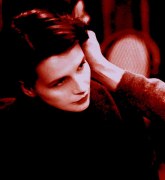Alice et Martin
aka Alice and Martin |
| |
 |
French language. France/Spain, 1998.
Rated R. 124 minutes.
Cast: Juliette Binoche, Alexis Loret,
Mathieu Amalric, Carmen Maura, Jean-Pierre Lorit, Marthe Villalonga, Roschdy
Zem, Pierre Maguelon, Eric Kreikenmayer, Jeremy Kreikenmayer
Writers: Olivier Assayas, Gilles Taurand, André Téchiné
Music: Philippe Sarde
Cinematographer: Caroline Champetier
Producer: Alain Sarde
Director: André Téchiné
LINKS
|
| Grade: C |
Review by Carlo
Cavagna |
Note: There are minor spoilers in the last paragraph.
They are marked.
 art
love story, part psychological drama, Alice and Martin would be an arresting
film if it weren't so... well, French, for lack of a better word. Alice and
Martin is often oblique and random for the sake of being oblique and random;
it gives you no reason to care about the story until the film is half over,
and it is unfathomable why Alice (Juliette Binoche) and Martin (Alexis Loret)
are drawn to each other in the first place. Because this is a French movie,
l'amour needs no reason to exist. Maybe it doesn't, but stalking was
still considered creepy the last time I checked. Furthermore, Alice is a grown-up.
Martin is not. One would expect more of a basis for Alice's attraction than
the fact that Martin looks great in a cologne advertisement.
art
love story, part psychological drama, Alice and Martin would be an arresting
film if it weren't so... well, French, for lack of a better word. Alice and
Martin is often oblique and random for the sake of being oblique and random;
it gives you no reason to care about the story until the film is half over,
and it is unfathomable why Alice (Juliette Binoche) and Martin (Alexis Loret)
are drawn to each other in the first place. Because this is a French movie,
l'amour needs no reason to exist. Maybe it doesn't, but stalking was
still considered creepy the last time I checked. Furthermore, Alice is a grown-up.
Martin is not. One would expect more of a basis for Alice's attraction than
the fact that Martin looks great in a cologne advertisement.
I'm getting ahead of myself. I should begin by explaining the story. Normally
this is the most tedious part of a movie review for both reader and writer,
but in this instance describing the plot is a public service. If you don't have to spend the first hour wondering what's going on, you can
focus more on the why of what's going on, and perhaps enjoy the film more than
I did.
If you don't have to spend the first hour wondering what's going on, you can
focus more on the why of what's going on, and perhaps enjoy the film more than
I did.
After spending the first ten years of his life with his mother (Carmen Maura),
Martin goes to live with his father Victor (Pierre Maguelon), who finally acknowledges
Martin as his son. Just before his twentieth birthday, Martin flees home when
Victor dies and ends up living in Paris with his half-brother Benjamin (Mathieu
Amalric), a struggling actor, and Alice, a struggling violinist. Unlike Benjamin
or Alice, Martin finds success quickly–within weeks he's a highly sought-after
model. Though Alice doesn't like the brooding Martin much, he becomes obsessed
with her, and finally a relationship develops. But alas, Martin has a nervous
breakdown.
We eventually learn the reason for Martin's erratic behavior and subsequent
breakdown, and it's a damn good reason. By that time, however, you may not care.
Until Martin has his breakdown, the story is told as a rapid, staccato series
of images and events. Martin lives in a shelter on a mountain–why? Martin follows
Alice around–why? Alice gives in to Martin's advances–why? People have meaningless
sex–why? Oh, that last one's easy. People have meaningless sex because that's
what people in French films do.
The goal of this decidedly European narrative style is to create eventually
a complete story out of seemingly disconnected events, rather like impressionist
painting, or better, pointillism. A pointillist would produce images out of
dots, each painted with a distinct dab of the brush, creating a whole that is
only apparent with distance. In Alice and Martin, each image, event,
or conversation is one of those dots. However, your patience will likely run
out before you see the whole. Worse, the fast pacing of the first half of the
movie makes it even more confusing, and then the film slows to a crawl just
as you understand what's going on. Moreover, the introductory segment about
Martin's childhood would have worked better in flashback later in the film.
The one thing that never makes sense, even after everything else does, is why
Alice is attracted to Martin. She's a catalyst for important changes in Martin,
but her own motivations are a mystery. Alice and Martin is really about
Martin. This is a shame, because Binoche is a much better actor than newcomer
Loret, who has no range, and lonely, emotionally hardened Alice is potentially
a much more interesting character than Martin, about whom it is difficult to
care even after we understand him. The emotional stakes aren't established early
enough to rouse interest in the denouement. If you can remain alert until then,
you'll enjoy Alice and Martin; if not, you'll write it off as another
one a' dem borin' furrin movies.
Review
© August 2000 by AboutFilm.Com and the author.
Images © 2000 October Films/USA Films. All Rights
Reserved.

 If you don't have to spend the first hour wondering what's going on, you can
focus more on the why of what's going on, and perhaps enjoy the film more than
I did.
If you don't have to spend the first hour wondering what's going on, you can
focus more on the why of what's going on, and perhaps enjoy the film more than
I did.
